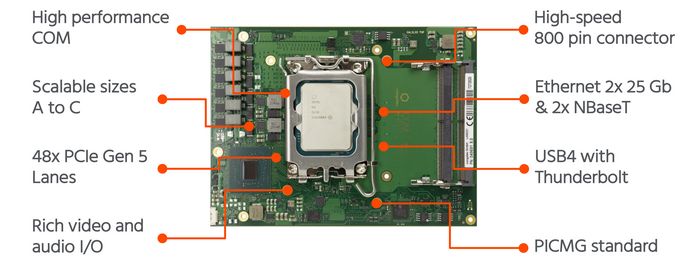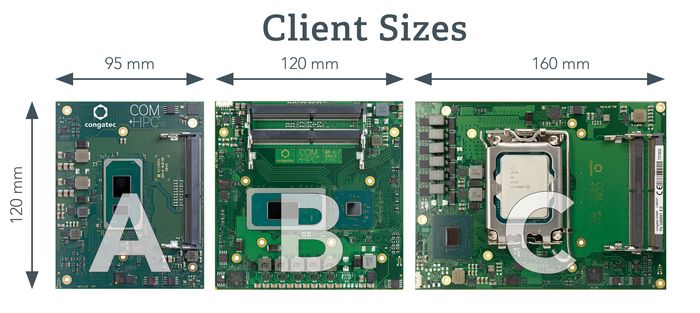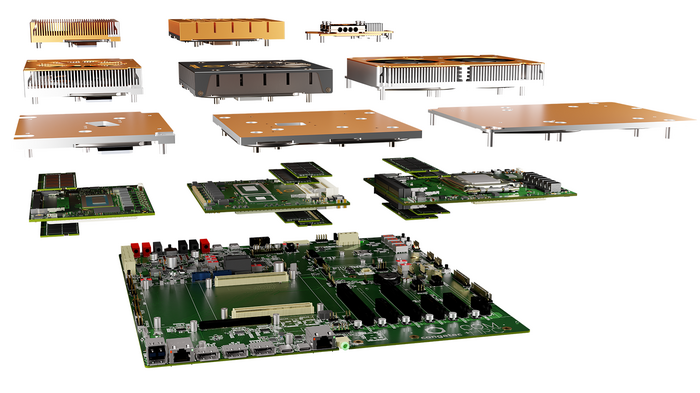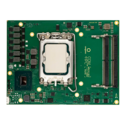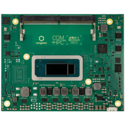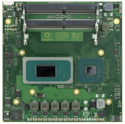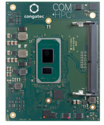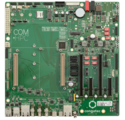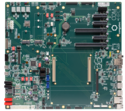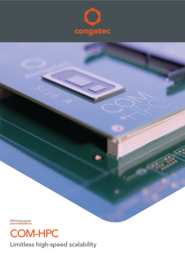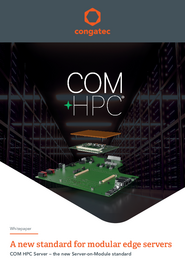
COM-HPC CLIENT-
A QUANTUM LEAP IN PERFORMANCE
Unmatched features and performance
for next-gen edge computing designs
COM-HPC Client – a quantum leap in embedded client performance
Unmatched features and performance for next-gen edge computing designs
COM-HPC Client modules are designed for high-performance embedded and edge computing applications requiring not only extensive computing power and I/O bandwidth but also powerful integrated graphics. COM-HPC Client modules can also be combined with other Client or server modules in one multi-module system design for ultra-high performance designs.
Facts, Features and Benefits
| Facts | Features | Benefits |
| 3 different sizes | COM-HPC Client modules come in Size A (120x95 mm), Size B (120x120 mm) and Size C (120x160 mm). | Different sizes allow designers to optimally balance the requirements of processor build, performance, memory capacity, and heat dissipation with the space provided by the application. |
| Latest interface technology | Support of more and higher bandwidth I/Os including PCIe up to Gen 5 and beyond, USB4 / Thunderbolt 4 and up to 4x 10 GbE. | Future-oriented interface technology for highest transfer rates, reducing bandwidth bottlenecks for an extra-long application lifecycle. |
| Immersive hi-res graphics and native camera support | COM-HPC Client modules support up to 4x independent graphics outputs and 2x MIPI CSI camera interfaces. | Edge applications require multi-display support with highest resolutions for an immersive user experience and high-quality visualization. This is especially helpful in medical and industrial imaging applications where camera interfaces are often required. |
| Increased power budget | Extreme performance thanks to power budgets of up to 251 Watt. | High power budgets provide more headroom for designers to leverage highly powerful CPUs, I/Os and memory, which all require more power for more performance. OEMs are advised to look for vendors that also offer optimized cooling solutions. |
Optimum balance of performance, power and size
COM-HPC Client modules come in 3 different sizes, starting at 120x95 mm (Size A) and increasing up to 120x160 mm (Size C). This enables COM-HPC Client modules to provide applications with a huge performance spectrum, ranging from power-optimized soldered CPUs on Size A to socketed high-performance processors and up to 4x SO-DIMM sockets on Size C. With these features, COM-HPC Client takes a unique position in terms of performance and interfaces above all other existing Computer-on-Module standards.
COM-HPC Client a game changer
COM-HPC Client modules address an application range that other existing standards, including the widely used COM Express standard, simply can’t cover. Nevertheless, COM Express - the most successful Computer-on-Module standard ever - will remain an important design platform which will be maintained for the next decade. The outstanding congatec support for COM Express won’t change. So, OEMs can be assured, that both standards provide the same level of design security.
Prepared for system consolidation
All COM-HPC Client Computer-on-Modules from congatec provide native support for real-time Hypervisor technology from Real-Time Systems. This enables to consolidate various functions that previously required separated system on one single system. This optimizes cost due to reduced system count as well as application reliability as less systems result in a higher Mean Time Between Failures (MTBF).
Furthermore, with its latest revision 1.15, the COM-HPC standard is now also prepared for applications requiring functional safety (FuSa). This simplifies the development of applications such as industrial real-time machine controls, train and wayside controls, collaborative robotics, autonomous vehicles, avionics, and other safety critical systems. With the Safe Hypervisor from Real-Time Systems system consolidation is now also possible for mission critical designs.
COM-HPC Client in comparison to COM Express Type 6
| COM-HPC Client | COM Express Type 6 (Spec 3.1) | |
| Footprint | 120x95 mm (Size A) | 125x95 mm (basic) |
| Construction height | 20 mm z-height from top of carrier board with heatspreader (5 mm stack option) | 18 mm z-height from top of carrier board with heatspreader (5 mm stack option) |
| Max. power dissipation | 251 Watt | 137 Watt |
| Signal pins | 800 | 440 |
| PCIe lanes¹ | 49x PCIe Gen 5 | 24x PCIe Gen 4 |
| Graphics¹ | 3x DDI + 1x eDP | 3x DDI + 1x LVDS/eDP / VGA |
| Sound¹ | 2x SoundWire + I2S + HDA | HDA (1x SoundWire optional) |
| Camera interface¹ | 2x MIPI CSI | 2x MIPI CSI via dedicated connectors on the module |
| Ethernet¹ | 2x 25 GbE KR + 2x BaseT (up to 10 Gb) | 1x GbE |
| USB¹ | 4x USB 4.0 + 4x USB 2.0 | 4x USB 3.2 or 2x USB 4.0 multiplexed with 2x DDI + 8x USB 2.0 |
| SATA¹ | 2x SATA Gen 3 | 4x SATA Gen 3 |
| CAN bus¹ | - | 2 |
| UART¹ | 2 | - |
| GPIO¹ | 12 | 8 |
| Other¹ | SMB, 2x I2C, IPMB | LPC/eSPI |
| FuSa¹ | Supported | Not supported |
¹ Not all IOs are available in parallel, some pins are shared
Complete ecosystem to simplify and accelerate new designs
Despite its young age, there is already a comprehensive COM-HPC Client ecosystem in place to accelerate and simplify designs based on this new standard. Besides a broad range of Computer-on-Modules, there is a PICMG carrier design guide, and congatec additionally offers matching evaluation and application carrier boards, advanced cooling solutions, as well design-in trainings to support its customers in the best possible way.
Our range of COM-HPC Client Computer-on-Modules
COM-HPC Client carrier boards
COM-HPC Client Videos
Do you want to learn more about COM-HPC?
Download our whitepapers!
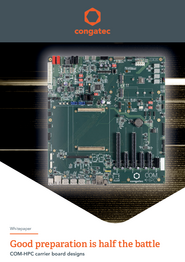
COM-HPC carrier board designs
COM-HPC is the upcoming new standard for modular high-end edge servers. It provides significantly faster and almost twice as many interfaces as COM Express. As a result, carrier board design requirements are increasing exponentially. How can developers prepare for the new challenges?



